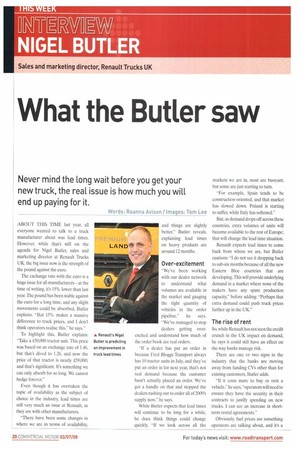What the utter saw
Page 20

Page 21

If you've noticed an error in this article please click here to report it so we can fix it.
Never mind the long wait before you get your new truck, the real issue is how much you will end up paying for it.
Words: Roanna Avison / Images: Tom Lee
ABOUT THIS TIME last year, all everyone wanted to talk to a truck manufacturer about was lead times. However, while that's still on the agenda for Nigel Butler, sales and marketing director at Renault Trucks UK. the big issue now is the strength of the pound against the euro.
The exchange rate with the euro is a huge issue for all manufacturers — at the time of writing, it's 15% lower than last year. The pound has been stable against the euro for a long time, and any slight movements could be absorbed, Butler explains. "But 15% makes a massive difference to truck prices, and I don't think operators realise this," he says To highlight this, Butler explains: "Take a £50,000 tractor unit. This price was based on an exchange rate of 1.46, but that's dived to 1.26, and now the price of that tractor is nearly £59,000; and that's significant. It's something we can only absorb for so long. We cannot hedge forever."
Even though it has overtaken the topic of availability as the subject of choice in the industry, lead times are still very much an issue at Renault, as they are with other manufacturers.
"There have been some changes in where we are in terms of availability, and things are slightly better," Butler reveals, explaining lead times on heavy products are around 12 months.
Over-excitement "We've been working with our dealer network to understand what volumes are available in the market and gauging the right quantity of vehicles in the order pi peline," he says. "We've managed to stop dealers getting overexcited and understand how much of the order book are real orders.
"If a dealer has put an order in because Fred Bloggs Transport always has 10 tractor units in July, and they've put an order in for next year, that's not real demand because the customer hasn't actually placed an order. We've got a handle on that and stopped the dealers rushing out to order all of 2009's supply now," he says.
While Butler expects that lead times will continue to he long for a while, he does think things could change quickly. "If we look across all the markets we are in, most are buoyant, but some are just starting to turn.
"For example, Spain tends to be construction-oriented, and that market has slowed down. Poland is starting to suffer, while Italy has softened."
But, as demand drops off across these countries, extra volumes of units will become available to the rest of Europe; that will change the lead time situation.
Renault expects lead times to come back from where we are, but Butler cautions: do not see it dropping back to sub-six months because of all the new Eastern Bloc countries that are developing. This will provide underlying demand in a market where none of the makers have any spare production capacity," before adding: "Perhaps that extra demand could push truck prices further up in the UK."
The rise of rent So, while Renault has not seen the credit crunch in the UK impact on demand, he says it could still have an effect on the way banks manage risk.
There are one or two signs in the industry that the banks are moving away from funding CVs other than for existing customers, Butler adds.
"If it costs more to buy or rent a vehicle," he says, "operators will need to ensure they have the security in their contracts to justify spending on new trucks. I can see an increase in shortterm rental agreements."
Obviously, fuel prices are something operators are talking about, and it's a topic Butler and Renault simply cannot ignore. Butler says: "It's having a huge impact. Fuel costs are high. Operators costs are high. There's a slowing of growth of contracts as people look at their cost base. Truck prices are rising and buyers are feeling overwhelmed."
But of those operators still buying, the environment is still a big issue, with people talking about CO2 output and biodiesel. As a result, Renault has seen a shift away from manual transmission in its tractor units to auto boxes.
"The problem with this is it takes longer to supply a vehicle with Optidrive. For good drivers, a manual box is probably more fuel efficient, but the industry does not always employ good drivers. People are also recognising SCR is slightly better economically than EGR." And all sales of heavy tractors are Euro-5, Butler says, even though Renault offers them as Euro-4. "We don't expect to sell Euro-5 on the lighter stuff, because the payback is so long."
Accredited centres Another growth area for Renault is the LCV sector, It is introducing an accreditation programme for its truck dealers to become LCV service centres. As Butler puts it: "The car people are reasonable at selling LCVs but not at providing the service and support. They don't fit in the car workshops; labour rates are high and they will only service during working hours." Truck dealers, though, have lower operational costs because they are not in expensive retail sites, Butler says. "They're set up for larger vehicles; and they understand that CVs need to be on the road during working hours."
The first to be accredited is Renault Trucks Midlands, in Tipton, followed by Blackburn-based XS Trucks. Butler hopes to have a further two up and running by the end of the year. •
FOR THE LATEST NEWS VISIT:
'-`-iruwar.roadtransport.comicm
































































































































































